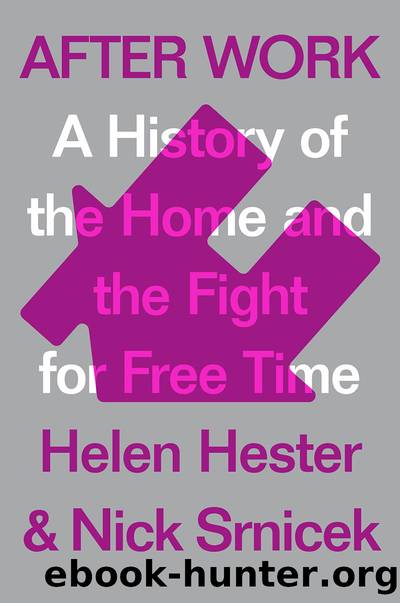After Work by Helen Hester & Nick Srnicek

Author:Helen Hester & Nick Srnicek
Language: eng
Format: epub
Publisher: Verso Books
Living without men in rural settings necessarily rewrote the scripts of gendered work. Under these circumstances, even residents who may have had no experience in tasks like repairing tools or cutting down trees were given the opportunity to develop these skills. Care work was still required in these communities, of course, and women duly performed it â but without any expectation that this should be their primary purpose or natural duty. While these utopian projects undoubtedly centre liberation not from but rather through work, separatism did (and does) involve a partial liberation from âwomenâs workâ, via both its collectivisation and the eradication of its coercively normative force. Indeed, many of the participants in these communities have âindicated they were able to âbecomeâ lesbian more fully on the land than they would have in a city, meaning that their identities as lesbians were strongly tied to their transcendence of gender roles and that such roles were more likely broken on the landâ.120 Such comments speak meaningfully to the performative role that work plays in the ongoing construction of personal identity (and, particularly in this context, oneâs navigation of the heterosexual matrix).
The discourses surrounding lesbian separatist communities, then, arguably lend themselves to anti-essentialist accounts of gender. One is not born but rather becomes a lesbian â and this process of becoming lesbian is deeply intertwined with work (as a force which makes and remakes the gender-sexuality nexus). However, this generates uncomfortable definitional questions for communities that seek to be available exclusively to women-loving-women: âIf women can do and be anything, then who are women? What makes them different?â121 It is from such questions that lesbian separatismâs notorious struggles with transphobia emerge. Separatist communes build their community around a position within the heterosexual matrix that they seek to undermine, meaning that âsome of the gender ideas or ideals that women use to create that sense of âlike usâ are gender essentials drawn ⦠from particularly raced bodies performing a particularly historic and cultural form of genderâ.122 In other words, if gender is no longer operational in conventional ways, then the gender difference around which such communities are based needs to attach itself to a different anchor, and in certain instances it locates this anchor within a fantasy of sexual dimorphism.123 By staging an exodus from the gender binary via the exclusion of one of its supposed poles, lesbian separatism at times finds itself in the paradoxical position of seeking to unmake gender through its rigid, biologised enforcement.
We would also flag at this point that some of the general criticisms applicable to withdrawal as a political tactic are also relevant in the case of some late twentieth-century lesbian separatist communes. As with the forms of exodus enacted by the acid communards, we must recognise that separatism can never be absolute â and that economic separatism in particular is impossible under current conditions. Cathy McCandless made this point in 1980, when she remarked upon what she viewed as the non-existence of lesbian separatism:
I know of no individual Lesbian or Lesbian community that is not economically involved with men in some way.
Download
This site does not store any files on its server. We only index and link to content provided by other sites. Please contact the content providers to delete copyright contents if any and email us, we'll remove relevant links or contents immediately.
The Secret History by Donna Tartt(16708)
The Social Justice Warrior Handbook by Lisa De Pasquale(11503)
Thirteen Reasons Why by Jay Asher(7825)
This Is How You Lose Her by Junot Diaz(5819)
Weapons of Math Destruction by Cathy O'Neil(5070)
Zero to One by Peter Thiel(4861)
The Myth of the Strong Leader by Archie Brown(4806)
Promise Me, Dad by Joe Biden(4472)
Beartown by Fredrik Backman(4459)
How Democracies Die by Steven Levitsky & Daniel Ziblatt(4440)
Stone's Rules by Roger Stone(4434)
The Fire Next Time by James Baldwin(4365)
100 Deadly Skills by Clint Emerson(4103)
A Higher Loyalty: Truth, Lies, and Leadership by James Comey(4052)
Rise and Kill First by Ronen Bergman(4038)
The David Icke Guide to the Global Conspiracy (and how to end it) by David Icke(3908)
The Farm by Tom Rob Smith(3890)
Secrecy World by Jake Bernstein(3801)
The Doomsday Machine by Daniel Ellsberg(3749)
